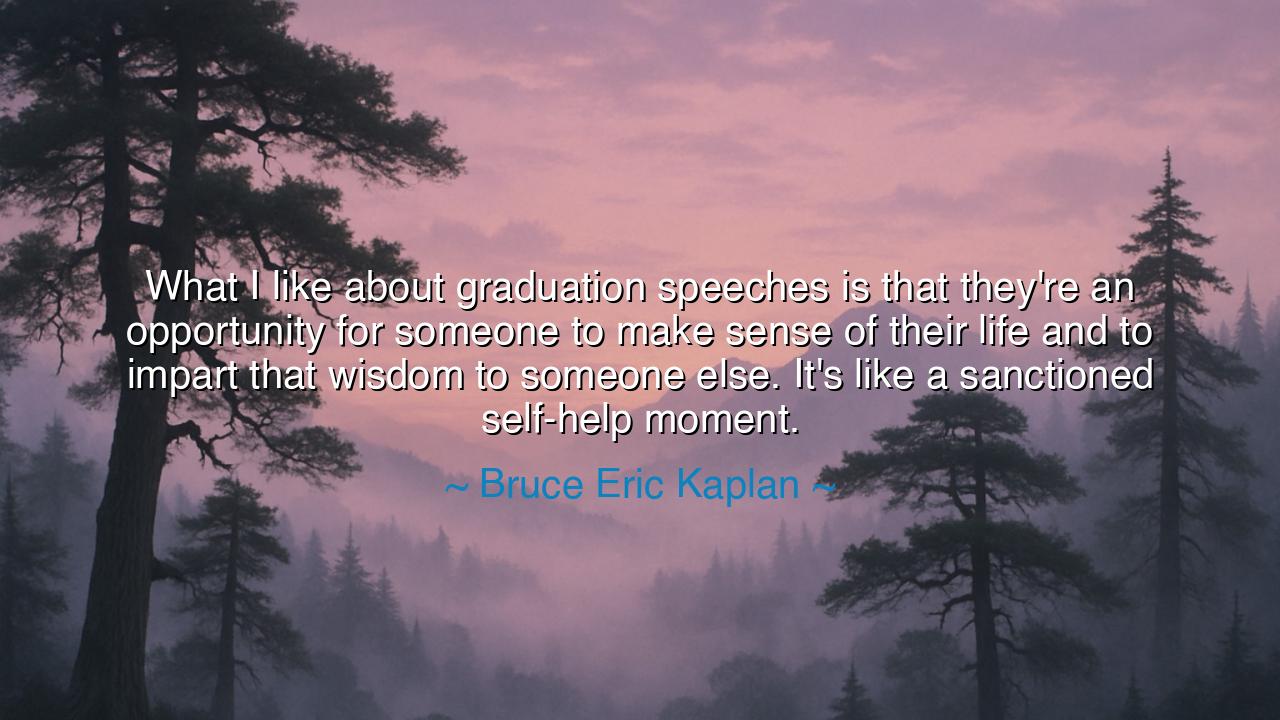
What I like about graduation speeches is that they're an
What I like about graduation speeches is that they're an opportunity for someone to make sense of their life and to impart that wisdom to someone else. It's like a sanctioned self-help moment.






In the reflection, “What I like about graduation speeches is that they're an opportunity for someone to make sense of their life and to impart that wisdom to someone else. It's like a sanctioned self-help moment,” Bruce Eric Kaplan reveals the quiet majesty hidden within one of modern life’s most overlooked rituals — the graduation speech. Beneath the gowns and applause, he perceives something ancient and sacred: a moment when one human being, scarred by experience yet softened by time, stands before the young and transforms pain into wisdom. In that moment, the past ceases to be private; it becomes a gift — the offering of a soul that has wandered, learned, and now teaches.
Kaplan, a writer and cartoonist known for his dry wit and deep humanity, has always seen truth in the ordinary. His observation on graduation speeches is not about ceremony, but about the ritual of reflection. In a world that rushes endlessly forward, such occasions allow us to pause, to look backward without regret, and to weave our scattered experiences into a coherent story. When he calls it a “sanctioned self-help moment,” he means that for once, the sharing of vulnerability is celebrated, not hidden. The speaker becomes both confessor and guide, and the listeners — standing at the threshold of their own journeys — receive not instruction, but illumination.
There is something profoundly ancient in this act. Long before universities or diplomas, the elders of tribes would gather their youth around the fire, telling of mistakes, triumphs, and lessons learned at great cost. Their stories were not entertainment; they were survival — maps of wisdom drawn from suffering. The modern graduation speech is the same fire rekindled in a new form. It is a rite of passage, where the elder stands and says, “I have walked the road you are about to walk. Let my scars save you a few steps of pain.” To speak one’s truth before others is to sanctify experience, to turn memory into meaning.
Consider the famous address given by Steve Jobs at Stanford in 2005. In that speech, he told of dropping out of college, of being fired from his own company, of facing death through cancer — and yet finding, in each wound, the seed of renewal. “Stay hungry, stay foolish,” he said, not as a slogan, but as a creed distilled from hardship. His words have outlived him, whispered in classrooms, offices, and bedrooms across the world. That is what Kaplan means by making sense of one’s life — turning the chaos of living into language that others can hold onto when their own storms arrive.
The power of such moments lies in their mutual humanity. The speaker and the listener are not so different — one stands slightly ahead, that is all. The wisdom imparted is not commandment but companionship: the voice that says, “You are not alone.” Graduation speeches remind us that wisdom is not born of perfection, but of persistence — that every stumble has its purpose, and every detour its lesson. To share that truth publicly is to dignify imperfection, to transform personal struggle into collective strength.
Kaplan’s insight also challenges us to reflect consciously upon our own lives. Each of us, whether we stand on a stage or sit in the crowd, carries stories worth telling — moments when confusion gave way to clarity, when pain became understanding. To “make sense of one’s life” is not vanity; it is a duty of the soul. For the ancients taught that knowledge unshared is knowledge wasted. The wisdom we gain is not ours to hoard, but to hand forward — like a torch passed from one generation to the next, lighting the unknown road ahead.
The lesson in Kaplan’s words is clear: take time to reflect, to gather your experiences into meaning, and then share that meaning with others. Life gains its beauty not merely in being lived, but in being understood. Every hardship becomes holy when it teaches, every story noble when it serves. To speak one’s truth — whether before thousands or a single soul — is to heal the wound of isolation that every heart carries.
And so, the practical action is this: whenever life grants you a moment to speak — to mentor, to guide, to encourage — take it. Stand in your truth as those before you once stood. You need no stage, no robe, no ceremony. Every honest word, spoken with compassion, is its own graduation speech. For in sharing the lessons of your journey, you do not merely tell your story — you complete it, and in doing so, you light the way for another traveler still learning to make sense of theirs.






AAdministratorAdministrator
Welcome, honored guests. Please leave a comment, we will respond soon